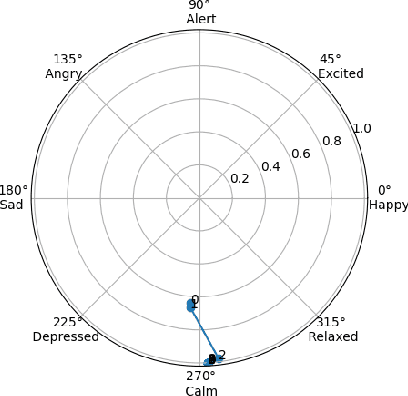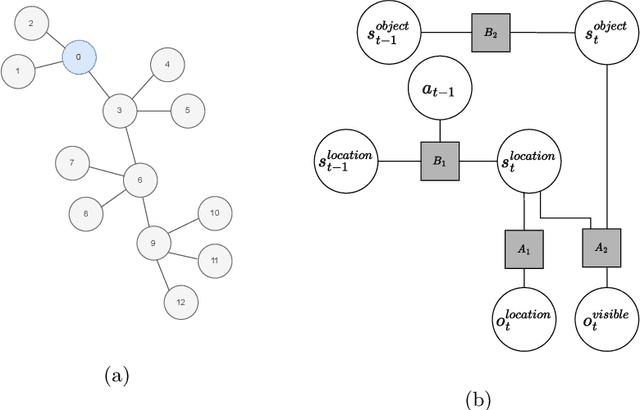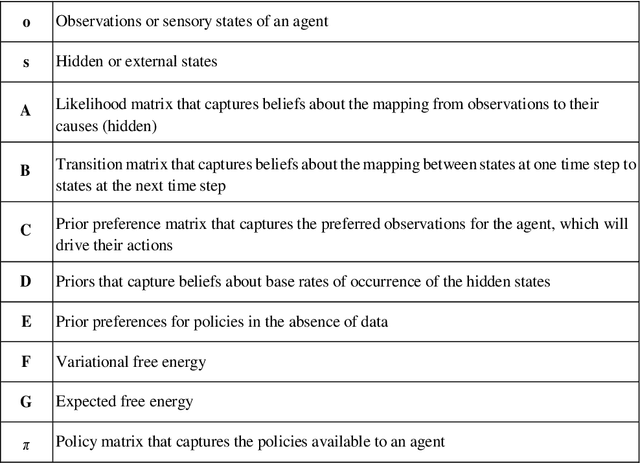Riddhi J. Pitliya
Mobile Manipulation with Active Inference for Long-Horizon Rearrangement Tasks
Jul 23, 2025Abstract:Despite growing interest in active inference for robotic control, its application to complex, long-horizon tasks remains untested. We address this gap by introducing a fully hierarchical active inference architecture for goal-directed behavior in realistic robotic settings. Our model combines a high-level active inference model that selects among discrete skills realized via a whole-body active inference controller. This unified approach enables flexible skill composition, online adaptability, and recovery from task failures without requiring offline training. Evaluated on the Habitat Benchmark for mobile manipulation, our method outperforms state-of-the-art baselines across the three long-horizon tasks, demonstrating for the first time that active inference can scale to the complexity of modern robotics benchmarks.
Free Energy in a Circumplex Model of Emotion
Jul 02, 2024



Abstract:Previous active inference accounts of emotion translate fluctuations in free energy to a sense of emotion, mainly focusing on valence. However, in affective science, emotions are often represented as multi-dimensional. In this paper, we propose to adopt a Circumplex Model of emotion by mapping emotions into a two-dimensional spectrum of valence and arousal. We show how one can derive a valence and arousal signal from an agent's expected free energy, relating arousal to the entropy of posterior beliefs and valence to utility less expected utility. Under this formulation, we simulate artificial agents engaged in a search task. We show that the manipulation of priors and object presence results in commonsense variability in emotional states.
Belief sharing: a blessing or a curse
Jul 02, 2024Abstract:When collaborating with multiple parties, communicating relevant information is of utmost importance to efficiently completing the tasks at hand. Under active inference, communication can be cast as sharing beliefs between free-energy minimizing agents, where one agent's beliefs get transformed into an observation modality for the other. However, the best approach for transforming beliefs into observations remains an open question. In this paper, we demonstrate that naively sharing posterior beliefs can give rise to the negative social dynamics of echo chambers and self-doubt. We propose an alternate belief sharing strategy which mitigates these issues.
Mapping Husserlian phenomenology onto active inference
Aug 24, 2022
Abstract:Phenomenology is the rigorous descriptive study of conscious experience. Recent attempts to formalize Husserlian phenomenology provide us with a mathematical model of perception as a function of prior knowledge and expectation. In this paper, we re-examine elements of Husserlian phenomenology through the lens of active inference. In doing so, we aim to advance the project of computational phenomenology, as recently outlined by proponents of active inference. We propose that key aspects of Husserl's descriptions of consciousness can be mapped onto aspects of the generative models associated with the active inference approach. We first briefly review active inference. We then discuss Husserl's phenomenology, with a focus on time consciousness. Finally, we present our mapping from Husserlian phenomenology to active inference.
 Add to Chrome
Add to Chrome Add to Firefox
Add to Firefox Add to Edge
Add to Edge